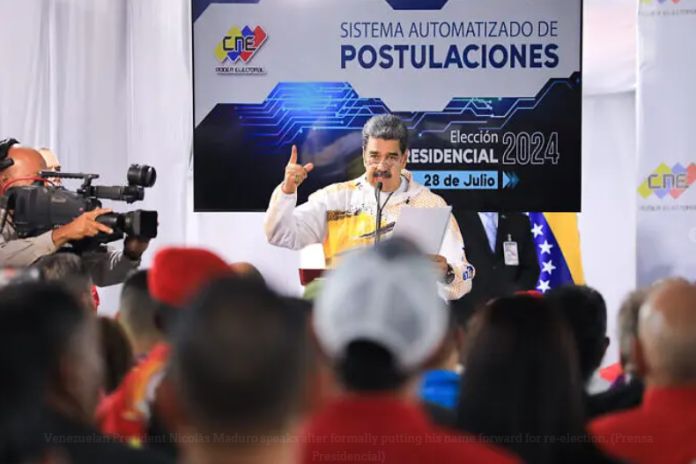Venezuela’s electoral authority accepted the registration of 13 candidates for the 2024 election including incumbent president Nicolás Maduro and a surprise last-minute registration of Zulia governor Manuel Rosales.
“Nearly five million women and men from this land stood up, voiced their reasons, their strength, their truth to nominate this man from Caracas, this ordinary man, this man from the barrios, a humble worker, as a candidate for the Presidency of the Republic,” said Maduro upon filing his candidacy.
The president’s candidacy on behalf of the United Socialist Party was ratified by the party’s rank and file in local assemblies. He was likewise backed by several parties in the pro-government Great Patriotic Pole.
Elvis Amoroso, president of the National Electoral Council (CNE), specified that the body will still need to review all of the candidates to ensure they comply with the country’s constitutional and legal requirements.
The last-minute registration of Manuel Rosales came as a surprise to many as his party, Un Nuevo Tiempo, forms part of the self-styled Unitary Platform that had chosen María Corina Machado as their candidate.
Machado opted to push forward with her candidacy despite an official disqualification following her victory in a controversial primary organized by the hardline opposition coalition. The Venezuelan Supreme Court upheld Machado’s 15-year ban from holding public office in January.
Voices inside her coalition pushed Machado to name a replacement candidate but she steadfastly refused until the last minute while appealing for pressure from Washington.
Machado ultimately acquiesced and tapped little-known 80 year-old academic Corina Yoris as her surrogate. However, Yoris was unable to register ahead of Monday’s deadline, with spokespeople claiming they could not access the electoral online platform and subsequently demanding an extension. The CNE reportedly registered Edmundo González Urrutia at the last minute, with the Unitary Platform reportedly looking to replace him in the coming weeks.
In a press conference Tuesday, Machado described Rosales’ decision to run as a “betrayal” but the Zulia governor said he had always respected the process set out by the Unitary Platform and only registered as a candidate in the light of the inability of Machado or Yoris to get on the ballot.
In a press conference of his own, Rosales said he would lead “the largest vote rebellion” in the history and Venezuela and that his candidacy marked “the beginning of a transition” in the country.
Rosales previously sought the country’s highest office in 2006, losing to Hugo Chávez in a landslide. It was not clear if the Unitary Platform would shift gears and back Rosales in the July 28 vote. The opposition coalition had largely wedded itself to Machado after her overwhelming victory in the primary but without a clear path beyond US threats to get her on the ballot.
In an interview with a Colombian radio station, Yoris said that Machado would not negotiate with Rosales nor call for Venezuelans to vote for him.
Machado nonetheless stated that she and her supporters would not stray from the “electoral path” suggesting she would abstain from backing violent protests as she had done previously in her political career. Last week, Venezuelan attorney-general Tarek William Saab announced arrests in connection to an alleged plan to revive violent street protests orchestrated by Machado’s far-right political organization.
Of the thirteen politicians registered to run, 12 are affiliated with the opposition. The opposition now faces a challenging scenario, with the Unitary Platform facing the choice of backing Rosales or further fracturing the opposition vote.
Out of the candidates, Antonio Ecarri (Lápiz), Benjamin Rausseo (Partido Conde) and Javier Bertucci (Esperanza por el Cambio) have been active in positioning themselves as third options. Ecarri came second in the 2021 mayoral elections in Caracas, whereas Rausseo is a well-known comedian and businessman. Evangelical pastor Bertucci ran in the 2018 elections, coming in third with over one million votes.
The other candidates, all men, are Luis Eduardo Martínez (Acción Democrática), Juan Carlos Alvarado (COPEI), Daniel Ceballos (Partido Arepa), José Brito (Primero Venezuela), Claudio Fermín (Soluciones Para Venezuela), Luis Ratti (Derecha Democrática Popular), and Enrique Márquez (Movimiento Centrados).





